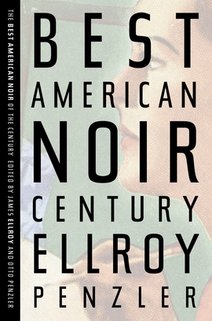
06 Oct 2010 01:18:30
In an introduction to "The Best American Noir of the Century," edited with James Ellroy, Penzler writes that works of noir "are existential, pessimistic tales about people, including (or especially) protagonists who are seriously flawed and morally questionable. The tone is generally bleak and nihilistic, with characters whose greed, lust, jealousy, and alienation lead them into a downward spiral as their plans and schemes inevitably go awry."
And, boy, do those ill-advised schemes and losers' dreams go awry in these delightfully devilish stories, which cover the time period 1910-2010.
The editors kick things off with Tod Robbins' gloriously odd tale of sideshow freaks, "Spurs," setting the stage for a strange trek through the years that includes stories from household names in the hard-boiled genre — James M. Cain, Mickey Spillane, James Lee Burke, Lawrence Block, Elmore Leonard — to lesser-known authors who nonetheless can hold their own with the legends.
A few favorites:
• Tom Franklin's "Poachers" (1998) oozes out of the swamp like the three strange creatures he profiles in this tale of murder and revenge. Part coming-of-age story, part mystery and part legend, it flawlessly captures the demise of a backwoods family and all who come in contact with it.
• Christopher Coake's "All Through The House" (2003) runs backward through time, a device that can fail in the wrong hands. But Coake tells the story of a country sheriff and the family whose cold-blooded and seemingly unexplainable murder he investigated with such deft assurance that it never fails to surprise.
• Elmore Leonard's "When the Women Come Out to Dance" (2002) is another in the master's long line of character studies that are less about murder and mayhem than about feel and tone. In this story, a stripper turned doctor's wife gets more than she expected when she hires a maid with a back story that includes murder.
• James W. Hall's "Crack" (1999) is about an obsessed voyeur who finds a hole in the wall between his apartment and a neighbor's, and how that window onto a different world eventually leads to the unraveling of his life.
• James Lee Burke's "Texas City, 1947" (1991) is the story of a family ripped apart by a father's callousness. The story has the foreboding feel and lyrical beauty of Burke's longer works of detective fiction, and leaves you with a sad, hollow feeling.
And, boy, do those ill-advised schemes and losers' dreams go awry in these delightfully devilish stories, which cover the time period 1910-2010.
The editors kick things off with Tod Robbins' gloriously odd tale of sideshow freaks, "Spurs," setting the stage for a strange trek through the years that includes stories from household names in the hard-boiled genre — James M. Cain, Mickey Spillane, James Lee Burke, Lawrence Block, Elmore Leonard — to lesser-known authors who nonetheless can hold their own with the legends.
A few favorites:
• Tom Franklin's "Poachers" (1998) oozes out of the swamp like the three strange creatures he profiles in this tale of murder and revenge. Part coming-of-age story, part mystery and part legend, it flawlessly captures the demise of a backwoods family and all who come in contact with it.
• Christopher Coake's "All Through The House" (2003) runs backward through time, a device that can fail in the wrong hands. But Coake tells the story of a country sheriff and the family whose cold-blooded and seemingly unexplainable murder he investigated with such deft assurance that it never fails to surprise.
• Elmore Leonard's "When the Women Come Out to Dance" (2002) is another in the master's long line of character studies that are less about murder and mayhem than about feel and tone. In this story, a stripper turned doctor's wife gets more than she expected when she hires a maid with a back story that includes murder.
• James W. Hall's "Crack" (1999) is about an obsessed voyeur who finds a hole in the wall between his apartment and a neighbor's, and how that window onto a different world eventually leads to the unraveling of his life.
• James Lee Burke's "Texas City, 1947" (1991) is the story of a family ripped apart by a father's callousness. The story has the foreboding feel and lyrical beauty of Burke's longer works of detective fiction, and leaves you with a sad, hollow feeling.

